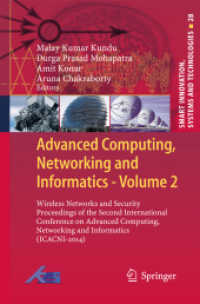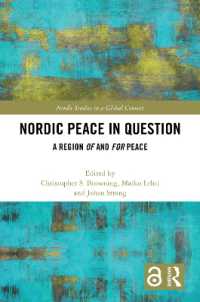Full Description
Over the past two decades, the field of comparative constitutional law has emerged as a major domain of scholarly inquiry. It has also been a notable feature in judicial practice. Many of the world's leading courts are now composed of at least some members who engage with comparative materials, and thinking comparatively has developed into one of the most significant ways of engaging in constitutional analyses.
Redefining Comparative Constitutional Law: Essays for Mark Tushnet reflects upon the field of comparative constitutional law. Among the most prominent figures in the development of the field in its ongoing renaissance has been Mark Tushnet. This book uses the occasion of Professor Tushnet's recent retirement from Harvard Law School to think critically about the field. Each essay takes up one of Professor Tushnet's major recent themes which focuses on variations within liberal constitutionalism and the possibility of other forms of constitutionalism that find articulation under other political regimes.
In this book, leading scholars contribute to the debate over the nature of the field, including the role of empiricism and language; discussions of democracy and entrenchment; analyses of rights and courts; consideration of constitutional design; and explorations of the extent to which there are varieties of constitutionalism.
At a moment of renewed stress and political debate over the relationship between democracy and constitutionalism, Redefining Comparative Constitutional Law: Essays for Mark Tushnet offers timely insights into comparative analyses of constitutional rights. Academics and students alike will benefit from the essays that range across both methodological questions and substantive analysis in the development of constitutions throughout the globe.
Contents
1: Rosalind Dixon: How to Compare Constitutionally: An Essay in Honor of Mark Tushnet
2: Ran Hirschl: Comparative Constitutional Law: Reflections on a Field Transformed
3: Tom Ginsburg and Mila Versteeg: Are Constitutions So Indeterminate that We Cannot Compare Them?
4: Sanford Levinson: Mark Tushnet's Central Contribution-and Challenge-to the Enterprise of Comparative Constitutionalism
5: David S. Law: Canon and Comparative Constitutional Law
6: Kim Lane Scheppele: Foxes, Hedgehogs, and Ants
7: Maartje De Visser: Constitutional Comparisons and Language
8: Frank I. Michelman: Reasonable Disagreement: Mark Tushnet, John Rawls, and a Democratic Point to Constitutionalism
9: Pratap Bhanu Mehta: The Challenge to Liberal Constitutionalism
10: Peter Cane: The Architecture of Constitutionalism
11: Richard Albert: Global Values in National Constitutions
12: Aharon Barak: The Constituent Power and Its Limits
13: Cheryl Saunders: Toward Deeper Dialogue: Constitutional and International Law
14: David Landau: Ancillary Powers of Constitution-Making Bodies
15: Dieter Grimm: Legal Reasoning Matters
16: Catherine O'Regan: The Political Paradox of African Constitutionalism Revisited: Kenya's BBI Case
17: Jeremy Waldron: Rights as the Domain of Weak-Form Review
18: David C. Donald: Common Law and the Liberation of Self-Interest from Regulation
19: Po Jen Yap: Dialogic Judicial Review and First World Autocracies
20: Yaniv Roznai: We the Fourth Branch? The People as an Institution Protecting Democracy
21: Sujit Choudhry: Constitutional Design and Political Parties
22: Vicki C. Jackson: Civic Virtue, Civic Obligation, Knowledge Institutions, and Proconstitutional Actors
23: Bojan BugariÄ: Popular Constitutionalism during Populist Times
24: Cora Chan: Pluralizing Constitutionalism
25: Madhav Khosla: Competitive Populism
26: Erin F. Delaney: Mapping Power Constitutionalism and Its Colonial Legacy
27: Jamal Greene: The Possibilities of Constitutional Tourism
28: Mark Tushnet: Constituent Power in Constitutional Theory, with a Note on Language and Method








